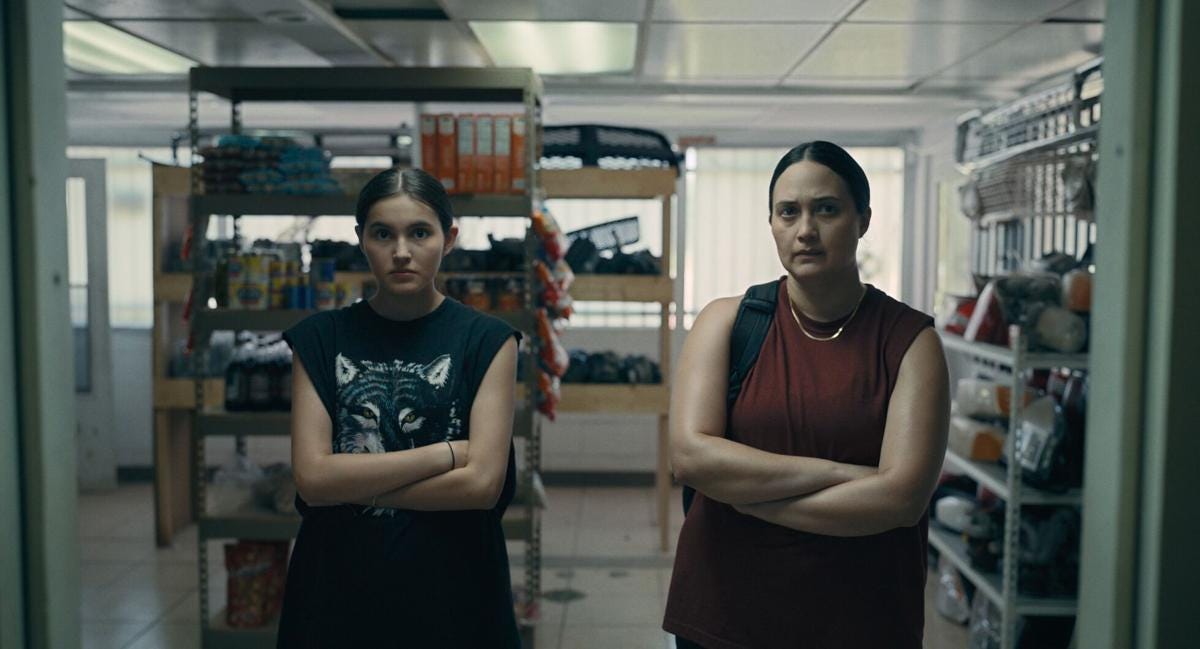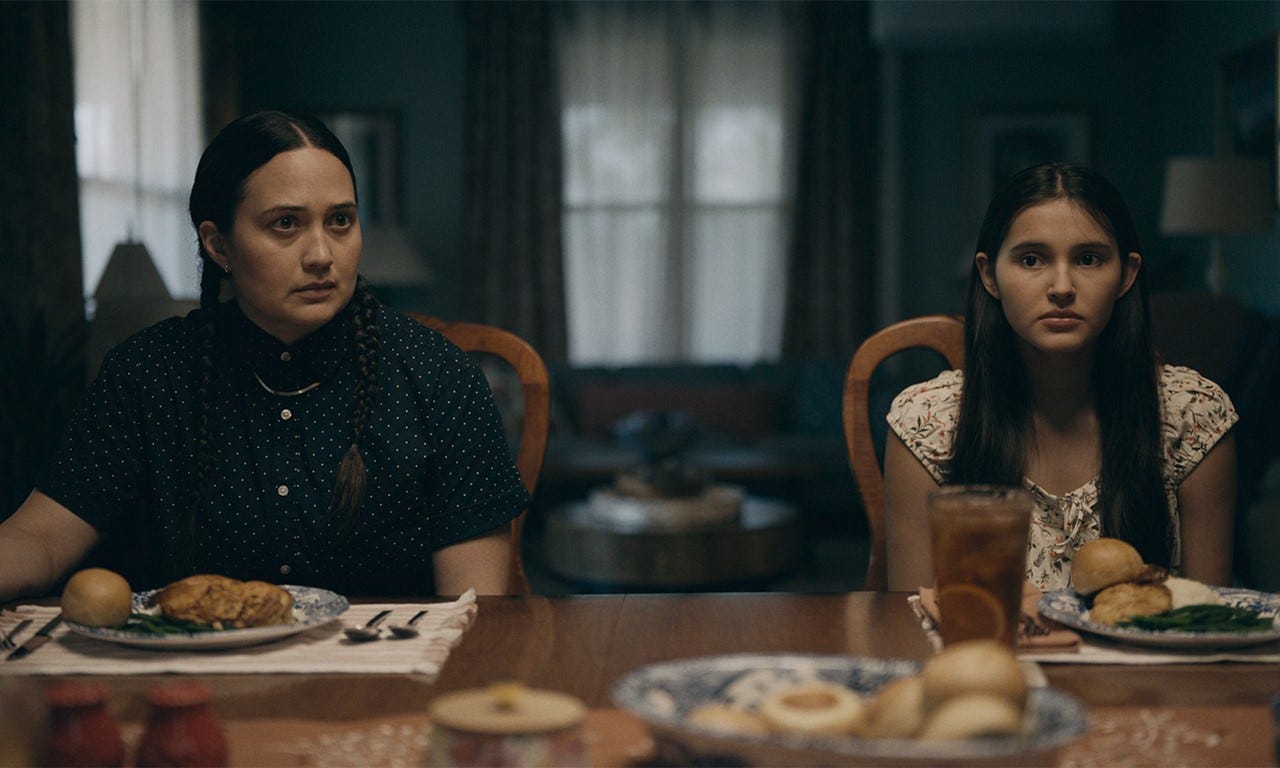In ‘Fancy Dance,’ Lily Gladstone Plays a Butch Lesbian We Haven’t Seen Before
On butch mothers and flawed heroes
This is the Sunday Edition of Paging Dr. Lesbian. If you like this type of thing, subscribe, and share it with your friends. Upgrade your subscription for more, including weekly dispatches from the lesbian internet, monthly playlists, and a free sticker.
For the next month – until August 7 – I will be donating proceeds from new paid subscriptions to Operation Olive Branch, a database that collects fundraisers for families seeking aid in Gaza. (I stole this idea from tv scholar.) If you start a monthly subscription, I will donate the full month, if you start a yearly subscription, I will donate $10 of that. If you don’t want to subscribe, you can donate on your own.
In Fancy Dance, Lily Gladstone plays yet another lesbian character, following their roles in Kelly Reichardt’s Certain Women and the Hulu series Under the Bridge. (They also star as one half of a lesbian couple in Andrew Ahn’s upcoming remake of The Wedding Banquet.) As we saw with their part in Under the Bridge, the response to Gladstone’s role in the film has been impassioned, and for good reason.
Gladstone plays Jax, the aunt of a 13-year-old girl named Roki (the incredible Isabel Deroy-Olson). Roki’s mother, Tawi (Hauli Sioux Gray), has gone missing, a victim of the epidemic of Missing and Murdered Indigenous Women plaguing indigenous communities across North America. With Tawi missing, Jax does her best to look after Roki, until social services step in and place her with her white grandparents, who she barely knows. Desperate to find answers about her sister and protect her niece, Jax takes Roki from her grandparents’ house and embarks on a road trip to the annual powwow she always dances in with her mother.
It doesn’t exactly go well. Though Jax clearly loves Roki and is doing the best she can, she doesn’t always make the best decisions, particularly when her emotions – stemming from a sense of familial love and protectiveness – take over. But despite her flaws, Jax is a lovable character who director Erica Tremblay asks us to empathize with, and with Gladstone portraying her, this is easy to do.
A modern continuation of the story told in Killers of the Flower Moon – about the loss of sisters – the film gives a face to the MMIW crisis, inviting us on to the Seneca-Cayuga reservation and into the lives of those most affected. Jax, though not entirely noble, is the hero of this story. Jax is also a butch lesbian, and this fact matters a great deal.
Jax represents a lesbian character we rarely see on screen. Recently, we’ve witnessed the emergence of a popular lesbian archetype in film and literature, what I call the “disaster lesbian.” This archetype is especially common in YA fare or coming-of-age stories – think of Bottoms, or a number of different contemporary lesbian novels. Jax is not that, nor is Fancy Dance one of those lighthearted stories. Though she struggles and often makes mistakes, she is quite confident in who she is. Her bad decisions stem from tricky circumstances, not quirky growing pains. She is steady in her selfhood, if not steady in her day-to-day life. Not a disaster – more like controlled chaos.
It’s significant that a butch lesbian drives the narrative of the film. Though Jax doesn’t easily slot into any cinematic archetypes, both Tremblay and Gladstone have said the character reminds them of people in the communities where they grew up. Her comportment, how she looks and moves, is a huge part of how the character comes to life. Jax’s butchness is always palpable, whether she’s wearing Adidas track pants or a sharp button-up. Even if you don’t know someone like Jax in real life, the distinct physicality Gladstone brings to the role makes her feel like someone you could know.
Jax is not only the heroic, driving force of the film, she’s also a butch lesbian mother figure – though perhaps “mother figure” isn’t the correct word here. Indeed, the distinction (or lack thereof) between the role of mother and aunt is explicitly discussed in the film. In a moment of strife between them, Roki asks Jax what the word for aunt means in Cayuga, and she responds “Little mother… it means your other mother”. The circumstances of their relationship may be difficult, but the way Jax mothers Roki – flaws and all – feels like a novelty.
It’s notable that while Jax’s sexual and gender identity is clearly important to who she is as a person, it’s never an explicit plot point nor a point of concern or interest for any of the other characters. Speaking to Outfest, Tremblay explained, “We wanted Jax’s queerness to not be the source of any specific struggle or the source of any specific trauma and that her being queer was just a part of her, like being native or a part of her, like being a hustler or part of her, like being a loving aunt.”
Apart from family, one of the only people Jax seems close to is Sapphire (Crystle Lightning), a dancer at the strip club where her sister worked. Jax and Sapphire appear to have a bond of sorts, but Jax still pays her for a moment of intimacy at the club. (For Tremblay, it was important to portray “a moment of consensual queer sex work.”) Sapphire plays her own part in the narrative too, giving Jax an essential clue in the puzzle that is her sister’s disappearance. Jax doesn’t totally let her guard down with Sapphire, but we can imagine that she might, given the right circumstances. Their relationship is a brief glimpse at Jax as a lover – and a gentleman, of course – adding richness to an already vivid character.
As I mentioned above, fan reactions to Jax have been euphoric (and yes, erotic). As with Under the Bridge, the context for this thirst is rather curious, but the way film and television gets digested online – in bite-sized pieces made up of gifs and fan edits – means Jax lives on beyond the narrative of the film. Lily Gladstone in a tank top, Lily Gladstone with a scantily clad woman on her lap – those images are timeless. Moreover, the almost rabid response to Jax indicates that there is a strong desire for characters like this, not to mention the cultural power of her presence on screen.
Ultimately, the film is successful at dropping viewers into a world they may be unfamiliar with, inviting you to care for and feel with these characters. Jax leads the charge here, moving through the world with heart, gumption, and a considerable amount of butch swagger. For that, we should be grateful.







